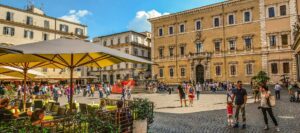Emperor Caracalla is Murdered
Suffering from dysentery while leading his army to Carrhae in Parthia (modern Iran), Emperor Caracalla stepped behind some shrubs to relieve himself. Julius Martialis, an officer in the imperial bodyguard, killed him with a single thrust of his sword. At last Rome was free of one of its most bloodthirsty emperors. A tyrant who had commanded mass slaughter in Germany and Alexandria, as well as murdering his own wife and brother.
The son of Emperor Septimius Severus, Caracalla had been born in Lugdunum (today’s Lyon) in AD188 with the original name of Septimius Bassianus.
According to the Roman historian Cassius Dio, his nickname came from a costume he invented – an ankle-length version of the Gallic caracallus, a short , close-fitting cloak with a hood.
When Caracalla was only ten, Septimius Severus made him and his younger brother Geta joint emperors. He intended to prepare them for shared authority when he should die. But, as Gibbon puts it, ‘The fond hopes of the father, and of the Roman world, were soon disappointed by these vain youths, who displayed the indolent security of hereditary princes and a presumption that fortune would supply the place of merit and application.’ The brothers hated each other, and over the next thirteen years each was committed to the other’s destruction. So bitter was their rivalry that each tried, unsuccessfully, to poison the other.
When Septimius Severus lay dying in 211, he counselled his sons: ‘Be united, enrich the soldiers, despise all others.’
Caracalla followed the last two of these directives but energetically rejected the first, immediately starting to plan Geta’s demise.
The next year he killed his brother with his own hands. Geta was cowering in their mother’s arms in the imperial palace. Caracalla then threw himself under the protection of the Praetorian Guard. He informed a powerless Senate that he had murdered in self-defence.
Now sole dictator, Caracalla melted down the coinage that displayed his brother’s features and then ordered the massacre of some 20,000 Romans whom he suspected of having supported him. People were killed in the streets, at the public baths and even in their own homes. Included in the slaughter was his own wife Publia Fulvia Plautilla, whom he had previously exiled.
Caracalla now became obsessed with Alexander the Great. He adopted what he thought were Alexander’s dress and weapons. He added a corps of elephants to his army. Appending the descriptor ‘Magnus’ (Great) to his own name, in 216 he set out to conquer Parthia as Alexander had done half a millennium before.
All the while Caracalla was becoming increasingly megalomaniacal. He issued new coins that portrayed himself as a god, claiming to be the son of the Egyptian deity Sarapis. He was the only Roman emperor to commission a statue of himself dressed as a pharaoh. But Caracalla’s delusions of grandeur were matched by his growing paranoia. He suffered from threatening nightmares. His dead father and brother pursued him, armed with swords, and, a few days before his murder. He dreamt that his father came to him, saying, ‘As you killed your brother, so will I slay you.’
The reasons why Caracalla was murdered remain debated.
Some maintain that his assassin, Julius Martialis, acted in revenge. The emperor had ordered the execution of his brother a few days before. Cassius Dio, however, insists that Martialis’ motive was more mundane: Caracalla had refused to promote him to centurion. Finally, Herodian makes the more likely claim that the commander of the Praetorian Guard, Marcus Opellius Macrinus, instigated the killing in order to take over the empire. (Macrinus did, in fact, become the next emperor, and, perhaps as a belated apology, agreed to Caracalla’s deification, but only fifteen months later he was overthrown and executed.)
In spite of the evil that Caracalla wrought in his lifetime, he left us one immense and beautiful memorial, the Baths of Caracalla in Rome. Originally designed to accommodate 1,600 bathers. Now where, on a summer evening, you can hear the triumphant arias of Verdi and Puccini during spectacular performances of open-air opera.
There’s truly something for everyone in Rome, no matter what age or interest! For more information on visiting Rome, feel free to get in touch by phone/sms/Whatsapp: +39 3408521612, through our Contact page, or via email: info@realrometours.com
Or view our selection of Intimate Group Tours, Private Tours and Day Trips!





